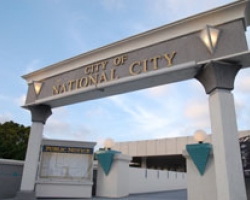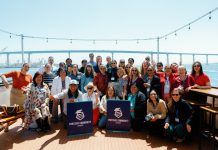Of the seven candidates running for two seats on the National City council only one—incumbent councilman Jerry Cano—chose not to participate in a Thursday evening forum that elicited their opinions on a wide range of topics from affordable housing to economic recovery during a pandemic.
Moderator Ashley Gonzalez gave Marcus Bush, Lorna Delos Santos, Daniel Perez, Gonzalo Quintero, Jose Rodriguez and Ditas Yamane each one minute to explain how they would address market-rate affordable housing.
Yamane, a real estate agent, said she would focus on encouraging builders and investors to invest in the city while Bush said it was necessary to expand investment in townhomes and condominiums as home ownership opportunities, promote infill building while also discussing rent stabilization to prevent gentrification displacement and getting developers to set aside 10% of their units as affordable housing.
Delos Santos, who works in community outreach at Samahan Community Health Center, said affordable housing should be an ongoing topic, including a focus on making National City an “age-friendly livable community”.
Perez said the city already has enough affordable housing and the city should instead streamline the permitting process.
“You try to build an affordable dwelling unit and you’re somewhere in the vicinity of ten to twelve thousand dollars whereas in other parts of San Diego you’re looking at two to four thousand… If you want to make it affordable, you need to make it affordable to build,” said Perez, a real estate agent.
Candidates were also asked to list key strategies they would pursue with city staff and leaders to ensure small business support and growth during the current pandemic.
Rodriguez said he would like to see the city and the Chamber of Commerce work together as well as streamline the permitting process.
Quintero, who was appointed to the city council two years ago after Alejandra Sotelo Solis left her post as council person when she was elected mayor, backed small business promotion but said business owners need to be “thinking long term” because it shouldn’t be about how to survive, it should be about how to adapt.
Gonzales asked what innovative policies they would propose to support the city’s economic development strategies in the next three years.
Delos Santos passed on the question, giving Perez the floor.
“I think it’s important we develop the community to be prepared. I believe we can really hone in and capture the huge growth that’s happening in the trade industry, for example, I know Sweetwater High School has the welding school. We need to focus on things like that so members of the community can better prepare for a career here in the city, outside of the city, and also get them into better paying jobs so they can become homeowners, build families, stimulate the economy, etcetera,” Perez said.
“In times of economic downfall, during times of economic recovery, the one industry you see thriving is the educational sector,” Quintero said.
He reiterated his plan to leverage relationships with existing unions to create a pipeline for education while simultaneously addressing housing issues. He also cautioned against relying on state and federal funding in the future, said “we have to do for ourselves” and utilize the city’s workforce to lift each other up.
Rodriguez offered a three-part answer: create a local hire ordinance so National City residents are working in the city; streamline approval processes to speed up construction opportunities; make sure building projects that use local laborers are a mixture of residential and commercial construction.
“To create jobs we need to make sure we invite investors into our city so there is that economic development cycle; we build our density by creating those jobs, we collaborate with those investors to stay in National City and build here. You help the people, they help your community: that’s economic development,” Yamane said.
Bush said he remembers college being pushed in high school but he would like to see apprenticeships encouraged as well to ultimately build into “women-owned businesses, Filipina, Mexican, Black-owned businesses” because that makes up the majority of our community members and “we need to be sustainable and lift from within.”
The moderator asked all the candidates to “share your thoughts on the impact of climate change locally and the role that city hall plays in addressing state mandates to reduce carbon emissions”.
Perez said the city needs to take a more educated approach than banning straws to appease the masses, “maybe look into what can really create an impact” based on science. “I’m not an expert,” he said, but willing to hear experts speak about climate change and see what solutions they can bring to the table.
Quintero, Rodriguez and Bush all gave answers that ideologically linked climate change and local development.
“We can work with developers to create walkable communities, built along transit oriented routes, tearing down parking structures near these routes and creating housing,” Quintero said, and “make it so the top floor has mixed use housing, the bottom floor has a doctor’s office, a dentist, an actual supermarket, not just a corner liquor store”.
Rodriguez described a similar vision, a 10-minute community where “people can just go grocery shopping, walk about, get a bite to eat, go hang out at a park” within ten minutes of home. He believes building walkable communities would “get us out of our cars and that means reducing our carbon footprint”.
Bush said he would like to see the trolley system improved so National City residents can “connect with major job centers like University Town Center”.
Delos Santos agreed with Bush and said she is actively doing outreach for San Diego Association of Government and believes public transportation is a primary way to reduce the local carbon footprint.
“Because of the pandemic, climate change gets pushed to the back burner,” Yamane said, but when the economy has somewhat recovered she would like to see collaboration between developers and environmentalists so newly built areas have walkable spaces.















